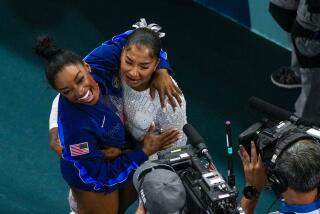Gymnastics Body Opposes U.S. Visit to South Africa
- Share via
The president of the United States Gymnastics Federation, Mike Donahue, said that he and other members of the organization’s executive committee opposed a decision to send a team of U.S. gymnasts to the South African Games, which began Friday at Johannesburg.
But Donahue said the executive committee did not learn of a commitment made to the games’ organizers by their executive director, Mike Jacki, until it was too late to withdraw the U.S. team. Donahue said the executive committee feared that the participation of U.S. gymnasts would be interpreted as support for the South African government’s policy of racial separation.
“We told Mike that if we could get out of it, we damn well should,” Donahue said Friday by telephone from his office in Bensenville, Ill. “He said we had made a commitment. As strong as the feelings were of the executive board, we felt we had to send a team at that point. It’s a delicate situation.”
Jacki was unavailable for comment.
The 12 U.S. gymnasts are the only Americans among the estimated 6,000 athletes from 17 countries who participated Friday in the opening ceremonies of the South African Games, which are one of the featured attractions of Johannesburg’s 100th Anniversary celebration. There will be competition during the next two weeks in sports as traditional as track and field and swimming and as esoteric as barefoot water skiing and lawn bowling.
South Africa has been excluded from the International Olympic Committee since 1960 because of its apartheid policies. But organizers contend that this event will serve as evidence that athletics in South Africa are racially integrated. Blacks were first allowed to compete in the South African Games in 1973.
Rudolph Opperman, chairman of the games and head of the South African Olympic Committee, told the Associated Press that the country’s sports establishment “has gone out of its way to eliminate discrimination and inequity as far as it’s in the powers of sportsmen to do.”
South African black leaders, however, have called for a boycott of the South African Games.
In an interview with the AP, Dr. Nthatho Motlana, a community leader in Johannesburg’s township of Soweto, disputed claims by the organizers that racial barriers have been removed from South African sports.
He said most amateur sports and most athletic facilities remain segregated.
Organizers said they could not estimate the number of blacks who will participate in the South African Games this year. One of the American gymnasts, Corrine Wright, from New York City, is black.
Some sports federations under the umbrella of the IOC prohibit athletes from competing in South Africa or against South Africans, but the International Gymnastics Federation (FIG) is not among them. Even though South Africa has chosen not to compete in international gymnastics championships since 1956, it remains a member of the FIG.
The USGF’s director of communications, John Arends, said the U.S. has sent gymnasts to South Africa on several occasions in recent years.
“Our position is basically that international sport is one of the last, best hopes for strengthening international understanding and for effecting positive change,” Arends said. “We are not politicians; we are sportsmen.
“But the situation in South Africa has deteriorated so much over the last two years that it’s changing the complexion of the way we view our relationship with that country. We were seeking a graceful way to decline this invitation, either because of some action by our international federation or out of concern for the safety of our athletes.
“Neither materialized. To pull out based on political reasons would have been contrary to our philosophy that sports and politics should remain separate. South Africa remains a member in good standing of (FIG.) We are bound by the charter to participate freely and openly with all nations that are in good standing. As for the safety of our athletes, we were assured by the State Department that they would not be in danger.”
Asked if the USGF would decline future invitations to South Africa, Arends said: “That’s the direction in which we’re moving. It’s a real tough decision, obviously, but the situation there is becoming larger than the language of the charter at this point.”
Arends said he expects negative public reaction to the U.S. gymnasts’ presence in South Africa.
“We’ll take a beating on it,” he said.
Donahue said he does not feel Jacki should bear the brunt of the criticism.
“The heat in South Africa keeps getting turned up and up and up,” he said. “If the situation when Mike made his decision had been the same as the situation is now, there is no question that Mike would have told them no. If he had seen any way he could have gotten out of our commitment, he would have. He is not insensitive to the circumstances there.”
More to Read
Go beyond the scoreboard
Get the latest on L.A.'s teams in the daily Sports Report newsletter.
You may occasionally receive promotional content from the Los Angeles Times.






